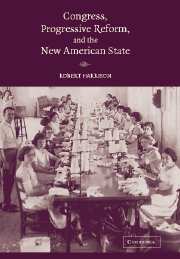Book contents
- Frontmatter
- Contents
- List of Tables
- Preface
- Acknowledgments
- Abbreviations
- Congress, Progressive Reform, and the New American State
- 1 Introduction
- 2 Congress and the Nation
- 3 The Troubled Subject of Railroad Regulation in the Progressive Era
- 4 Congress and the “Labor Question”
- 5 The Ideal of a “Model City”: Congress and the District of Columbia
- 6 The Senate and Progressive Reform
- 7 Patterns of Republican Insurgency in the House of Representatives
- 8 Progressivism, Democratic Style
- 9 Congress, Progressive Reform, and the New American State
- Appendix: The Analysis of Roll Calls
- Index
7 - Patterns of Republican Insurgency in the House of Representatives
Published online by Cambridge University Press: 25 July 2009
- Frontmatter
- Contents
- List of Tables
- Preface
- Acknowledgments
- Abbreviations
- Congress, Progressive Reform, and the New American State
- 1 Introduction
- 2 Congress and the Nation
- 3 The Troubled Subject of Railroad Regulation in the Progressive Era
- 4 Congress and the “Labor Question”
- 5 The Ideal of a “Model City”: Congress and the District of Columbia
- 6 The Senate and Progressive Reform
- 7 Patterns of Republican Insurgency in the House of Representatives
- 8 Progressivism, Democratic Style
- 9 Congress, Progressive Reform, and the New American State
- Appendix: The Analysis of Roll Calls
- Index
Summary
Republican insurgents in the House of Representatives were celebrated in their day as leading protagonists in the struggle for progressive reform. “The Insurgent movement,” proclaimed Mark Sullivan in the wake of the campaign to revise the House rules, “has come to mean much more than a change in parliamentary procedure … it is the crystallization of the people's demand for progress and for relief from control of the United States Government by and for organized wealth.” William Allen White was still more fulsome: “The insurgent movement was nothing in God's world but implementation of the deepening moral intelligence of the American people.” Historians, too, were for a long time content to view the phenomenon within a frame of reference set by the participants themselves. James Holt, for example, described the insurgents as “outstanding reformers in an age of reform” and their revolt against the conservative leadership in Congress as “one of the most celebrated movements of the whole ‘progressive era.’”
Whereas earlier historians did not seriously question the insurgents' reform credentials, recent writing has adopted a more critical tone. David Sarasohn offers a salutary reminder that reform measures in Congress received more consistent support from Democrats than from their irregular Republican allies. In a study of the “Congressional Revolution of 1910,” John D. Baker describes the movement to revise the House rules, not as “part of the progressive movement,” but as “an isolated maneuver motivated largely out of political self-interest.”
- Type
- Chapter
- Information
- Congress, Progressive Reform, and the New American State , pp. 192 - 228Publisher: Cambridge University PressPrint publication year: 2004



